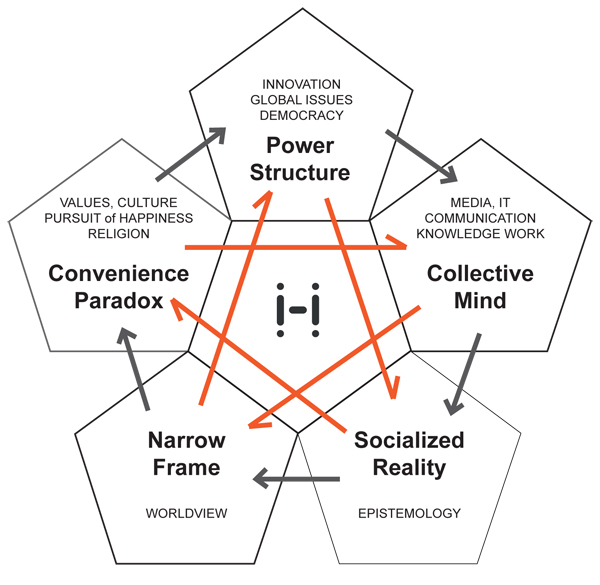Holotopia: Ten themes
H O L O T O P I A P R O T O T Y P E
Ten themes
Black arrows
Governance
Cybernetics of Democracy
This is a play on words, because "cybernetics" means roughly "science of governance" or "science of governability". The basic point that cybernetics has in store for us is that to be viable (or "sustainable"; Wiener uses the technical keyword "homeostasis", which is elegant and more to the point), a system must have some requisite structure ("communication and control" or "feedback and control")—which our governance systems as a rule don't have. Various subtleties or 'spices' are added by placing this conversation in the context of the power structure insight (where the issue of systemic structure is linked with the issue of power) and the collective mind insight (where we see that our communication is profoundly dysfunctional—even though the new media were created to give us the kind of communication we need.
The springboard story here might be about Jørgen Randers and his observation, after 40 years of frontier experience, that "we need a paradigm shift in governance". The Wiener–Jantsch–Reagan thread from the The Paradigm Strategy poster will provide both the big picture and the nuances.
Yes, we really need new 'headlights'!
Culture
Ludens: A Brief History of Modernity
While we may be biologically equipped to evolve as the homo sapiens, we have in recent decades devolved to become the homo ludens—who instead of seeking knowledge to understand the world, shuns understanding and adapts by simply learning the rules of the 'game' and 'playing' competitively. By placing this conversation in the context of the collective mind insight (which tells us that we cannot really see through the complexities of our world, when we look at it 'in the light of a candle') and the socialized reality insight (which tells us that while renegade socialization has always been a core cultural issues, we have for interesting reasons surrendered our cultural defenses to the power structure), we provide both for simple understanding of the homo ludens phenomenon, and for all the colorful subtleties.
The Nietzsche–Ehrlich–Giddens thread provides a good entry point into this theme.
Science
Transdisciplinarity—Future Science
We are not talking about "science" as "what the scientists are doing" but "science" in the larger social role it has acquired—as the provider of trusted and sanctioned "truth and meaning" for all of society. The role of "Grand Revelator of Modern Western Culture", as Benjamin Lee Whorf phrased it.
Here the stories of Erich Jantsch, Doug Engelbart and other progenitors of knowledge federation need to be brought in as evidence; and Knowledge Federation's own record of 'success' in bootstrapping academic-systemic change, which we called Quixote stunts, not without reason.
To what degree has the scientific discipline become a power structure?
This is where the academic self-reflective dialog in front of the mirror takes place. Can science step through the mirror—and guide our society to a new evolutionary course?
Education
Zero to One—Future Education
By considering the future of education in the context of the narrow frame insight and the convenience paradox insight, we can see why, as Ken Robinson pointed out, "education kills creativity": Education has evolved as a way to socialize people to think and act within the narrow frame. As part of the power structure. Can education become a way to improve "human quality"—as our new challenges require?
The title of this conversation is borrowed from Peter Thiel's book, where it's intended to point to a certain kind of creativity. We know all about taking things that already exist from one to two, and to three and up to one hundred and beyond. What we need is the capability to conceive of and create things that do not yet exist.
Can we free education from its role of socializing people into a worldview, and re-conceive it to have "human development" as goal?
Business
Business unusual
Being placed in the context provided by the convenience paradox insight and the power structure insight, this conversation provides a strategically most interesting answer to the key question:
How can the holotopia overcome the existing power structure?<p>No conflict is needed; we can co-opt the powerful!
The key is to see that the power of the powerful is an illusory one—only borrowed from the power structure, as compensation for services. The price paid is of course wholeness—both personal and systemic. It is the prerogative of power structure to make us pursue "power" against our interests.
The Adbusters left us a useful keyword, "decooling"; a decooling of our popular notions of success and power that is ready to take shape, in the context of those mentioned two insights.
Red arrows

